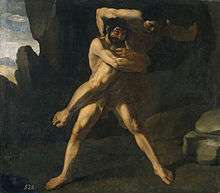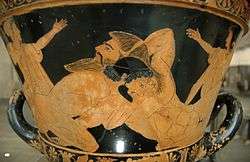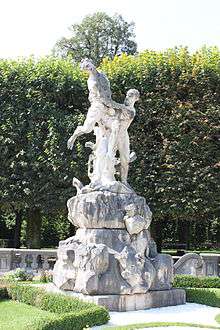Antaeus
 Hercules Fighting Antaeus (1634), by Francisco de Zurbarán | |
| Grouping | Legendary creature |
|---|---|
| Sub grouping | Half-giant |
| Parents |
Poseidon Gaia |
| Mythology | Greek |
| Region | Africa |
| Habitat | In the interior desert of Libya. |
Antaeus (Greek: Ἀνταῖος, Antaîos, lit. "Opponent"; Berber: Änti) was a figure in Greek and Berber mythology. In Greek sources, he was the half-giant son of Poseidon and Gaia.[1][2] His wife was the goddess Tinge, and he had a daughter named Alceis or Barce. He was famed for his loss to Hercules during that demigod's 12 Labors.
Mythology


Antaeus would challenge all passers-by to wrestling matches and remained invincible as long as he remained in contact with his mother, the earth.[3] As Greek wrestling, like its modern equivalent, typically attempted to force opponents to the ground, he always won, killing his opponents.[3] He built a temple to his father using their skulls.[3] Antaeus fought Hercules as he was on his way to the Garden of Hesperides as his 11th Labor. Hercules realized that he could not beat Antaeus by throwing or pinning him. Instead, he held him aloft and then crushed him to death in a bearhug.[4][5]
The contest between Hercules and Antaeus was a favored subject in ancient[3] and Renaissance sculpture.
Location in Africa
Antaeus was known to the Berbers as Änti, a distinct figure from the Egyptian god of that name. Greeks of the 6th century BC, who had established colonies along the coast of North Africa, placed Antaeus in the interior desert of Libya.[6]
A location for Antaeus somewhere beyond the Maghreb might be quite flexible in longitude: when the Roman commander Quintus Sertorius crossed from Hispania to North Africa, he was told by the residents of Tingis (Tangier), far to the west of Libya, that the gigantic remains of Antaeus would be found within a certain tumulus; digging it open, his men found giant bones; closing the site, Sertorius made propitiatory offerings and "helped to magnify the tomb's reputation".[7] In Book IV of Marcus Annaeus Lucanus' epic poem Pharsalia (c. AD 65-61), the story of Hercules' victory over Antaeus is told to the Roman Curio by an unnamed Libyan citizen. The learned client king Juba II of Numidia (died 23 BC), husband of the daughter of Antony and Cleopatra, claimed his descent from a liaison of Hercules with Tinga, the consort of Antaeus.[8] In his Life of Sertorius cited above, Plutarch recounts what he says to be a local myth, according to which Hercules consorted with Tinge after the death of Antaeus and had by her a son Sophax, who named a city in North Africa Tingis after his mother. Sophax in his turn was father of Diodorus who conquered many Libyan peoples with his army of Olbians and Mycenaeans brought to Libya by Hercules.[9] Moreover, some related that Hercules had a son Palaemon by Iphinoe, the daughter of Antaeus and (presumably) Tinge.[10]
Scholiasts on Pindar's Pythian Ode 9 also recorded a story which made Antaeus king of the city Irassa in Libya, and father of a daughter named either Alceis or Barce. Antaeus promised her hand to the winner of a race, just like Danaus did to find new husbands for his daughters. Alexidamus beat all the other suitors in the race and married the daughter of Antaeus. Three versions of this story, with minor variations, were collected by the scholiasts; one of those versions made Antaeus, king of Irassa, a figure distinct from the Antaeus killed by Hercules, while another one suggested that they were one and the same.[11]
He is alluded to in Olson's poem "Purgatory Blind".[12]
In popular culture
- In Dante Alighieri's Inferno, Antaeus is shown among the giants at the edge of Hell's Circle of Treachery. He lowers Dante and Virgil into the Circle of Treachery as he was the only giant not chained up outside the Circle of Treachery.
- In Samuel Butler's novel The Way of All Flesh, Ernest Pontifex's aunt Alethea encourages him to learn carpentry "as a means of kissing the soil should his Hercules ever throw him;" that is, to learn a trade to live off of in case he chooses not to pursue the object of his studies, theology.
- In the made-for-TV movie Hercules and the Circle of Fire, Hercules fights Antaeus (who is depicted as a rocky half-giant).
- In the TV miniseries Hercules, Antaeus is one of the hero's main antagonists.
- Antaeus appears in the Hercules episode "Hercules and the Hostage Crisis" voiced by Miguel Ferrer. He is depicted as a Half-Titan/Half-Giant who led the terrorist organization P.O.O.T.L.s (short for "People's Organization of Titanic Liberators") and led them into holding the Prometheus Academy hostage. Antaeus planned to capture Hercules so that he can use him as bait for Zeus and get him to free the Titans.
- The story is used in Seamus Heaney's poems "Antaeus" and "Hercules and Antaeus", published in Death of a Naturalist (1966) and North (1975). See Seamus Heaney, Opened Ground: Poems 1966-1996.
- Antaeus appears in the film Hercules Unchained. However, Hercules does not kill him.
- Antaeus appears in Rick Riordan's Percy Jackson & the Olympians series where he appeared in Battle of the Labyrinth. He ran an arena where he challenged anyone to a fight. Percy Jackson kills Antaeus by hanging him from a chandelier and stabbing him in the stomach. There was also a reference that Antaeus was a son of Gaia.
- Plato uses Antaios as a metaphor: You seem to me to play rather the role of Antaios; for you do not let anyone go who approaches you until you have forced him to strip and wrestle with you in argument.
- Socrates also had an Antaios metaphor: Your comparison with . . . Antaios pictures my complaint admirably; only I am a more stubborn combatant than they; for many a Herakles . . . strong men of words, have fallen in with me and belabored me mightily."
- Antaeus is a short story by Borden Deal. It is named after the mythological figure Antaeus, a giant who was unconquerable as long as he touched the ground.
- Antaeus is also the name of a popular Chanel cologne for men.
- Antaeus appears in the 1987 children's novel "Dr. Dredd's Wagon of Wonders", written by Bill Brittain, as the servant of a hellspawn. He is defeated by the local blacksmith in the same fashion as Hercules.
- The Antaeus Company is a Classical Theater Company in North Hollywood dedicated to strengthening the roots of Los Angeles theater actors.
- In William Gaddis's The Recognitions, the character Gwyon says that Spain is still on the earth, while the United States, like Antaeus, is "being crushed in the air."
- In Kyoryu Sentai Zyuranger, the monster Dora Antaeus is named after Antaeus. Dora Antaeus is the Sentai counterpart to Mighty Morphin Power Rangers monster Hatchasaurus while Dora Antaeus's heart was adapted as Cardiatron.
- In Ray Bradbury's 1953 novel Fahrenheit 451, the legend of Hercules and Antaeus is referenced to as a metaphor for the impractical overindulgence of mankind.
- In Neal Stephenson's novel "Cryptonomicon", Alan Turing is compared to Antaeus, "Turing is neither a mortal nor a god. He is Antaeus. That he bridges the mathematical and physical worlds is his strength and his weakness.”
- In the film The Great Debaters, based on the true story of the Wiley College debate team facing racial discrimination in the Depression-era American South, the team coach Melvin B. Tolson uses Antaeus as a metaphor for the team as when they face unfair treatment for their team, as Antaeus would be thrown to the ground, they will only be made stronger.
- "Antaeus: Earth Again" is the title of Book Six of Thomas Wolfe's autobiographical novel "Of Time and the River".
- In Hostile Waters: Antaeus Rising, it is the name of a class of technologically advanced "adaptive cruisers", as well as the last remaining vessel of that class.
- Antaeus is also the name of a black metal band from France formed in 1994.
References
Citations
- ↑ Apollodorus, 2.5.11
- ↑ Hyginus, Fabulae 31.
- 1 2 3 4 EB (1878).
- ↑ Pseudo-Apollodorus, Bibliotheke ii. 5.
- ↑ Hyginus, Fabula 31.
- ↑ I. Malkin, Myth and Territory in the Spartan Mediterranean, 1994:181-87, giving sources, noted in Robin Lane Fox, Travelling Heroes in the Epic Age of Homer, 2008:182 and note 51.
- ↑ Fox 2008:182, noting Plutarch, Sertorius9.3-4.Fox 2008:182
- ↑ Pliny, Natural History, 5. 2-3; Strabo 17. 3. 8 noted in D.W. Roller, The World of Juba II and Kleopatra Selene, 2003:54 and 154, and by Fox 2008:182.
- ↑ Plutarch, Life of Sertorius, 9. 4
- ↑ Tzetzes on Lycophron 662
- ↑ Scholia on Pindar, Pythian Ode 9, 185, referring to Pherecydes, Pisander of Camirus and other unspecified writers
- ↑ Olson, Charles. The collected poems of Charles Olson: excluding the Maximus poems. University of California Pr, 1997. p.3
Bibliography
- "Antæus", Encyclopædia Britannica, 9th ed., Vol. II, New York: Charles Scribner's Sons, 1878, p. 100.
- "Antaeus", Encyclopædia Britannica, 11th ed., Vol. II, Cambridge: Cambridge University Press, 1911, p. 88.
-
 Beach, Chandler B., ed. (1914). "Antæus". The New Student's Reference Work. Chicago: F. E. Compton and Co.
Beach, Chandler B., ed. (1914). "Antæus". The New Student's Reference Work. Chicago: F. E. Compton and Co. - Apollodorus, Apollodorus, The Library, with an English Translation by Sir James George Frazer, F.B.A., F.R.S. in 2 Volumes. Cambridge, MA, Harvard University Press; London, William Heinemann Ltd. 1921.
- Hyginus, Gaius Julius, The Myths of Hyginus. Edited and translated by Mary A. Grant, Lawrence: University of Kansas Press, 1960.
- Smith, William; Dictionary of Greek and Roman Biography and Mythology, London (1873). "Antaeus" 1.
External links
-
 Media related to Antaeus at Wikimedia Commons
Media related to Antaeus at Wikimedia Commons - "ANTAIOS", The Theoi Project
|